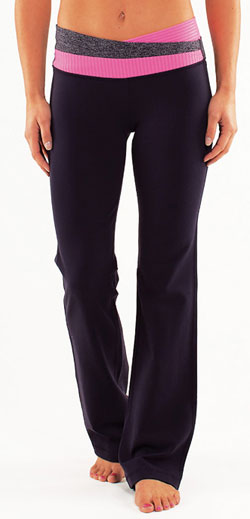Nama-Stay: Lululemon Is Defending Its Turf Through Design Patents

Courtesy of LuluLemon
Lululemon’s pricey and popular fitness apparel has captured the imagination of devotees, along with competitors seeking a slice of the company’s market share. But the yoga-wear powerhouse has been far from zen about protecting its turf and has been actively patenting its distinctive designs.
Now the Canadian company is striking a warrior pose, suing fashion design firm Calvin Klein Inc. and manufacturer G-III Apparel Group Ltd. over allegations that Calvin Klein infringed Lululemon’s design patents related to the waistband of its signature $98 Astro Pant.
“They’re trying to turn their innovative designs into a competitive advantage, and they’re using legal protections to do that,” says University of Ottawa law professor Jeremy de Beer. “It remains to be seen if the strategy is going to be effective. At the very least it’s going to give competitors second thoughts because it may not be worth the legal headache.”
Lululemon has cornered a fashion niche with a low barrier to entry. As a result, the company is investing in legal capital to retain its position at the top of the market. Design patent litigation is not a common move in the fashion industry, but it is part of a broader trend where designers are seeking creative ways to protect their intellectual property rights. Some experts argue that these sorts of claims are not in the best interest of fashion—or the true intent of the law.
De Beer worries designers could “stockpile” patents to use as a threat and deterrent with no intent to actually litigate, “like some kind of intellectual property cold war.”
But design patents aren’t within reach of your average entrepreneur. They are intended to cover ornamental, nonfunctional aspects of an item, which must be new, nonutilitarian and nonobvious. Design patents are expensive, time-consuming and potentially not worth the cost, particularly for seasonal items, experts say.
“The problem is you can’t go out and patent everything,” says Harley Lewin, a partner at McCarter & English in Manhattan whose clients include Christian Louboutin, Alexander Wang and Diane von Furstenberg. “You have a delay and … you have to remember a design patent is a very literal interpretation, and someone has to copy you pretty exactly. The likelihood of losing is high. It’s mostly used as a deterrent.”
Susan Scafidi, founder of Fordham University’s Fashion Law Institute, agrees, noting that Lululemon’s complaint is as much about public relations as it is about the infringement case itself.
“One small step for yoga pants, one large step for a company,” Scafidi says. “They are using the [design patent] procedure to aggressively enforce any infringement. It’s a PR move as well, sending a warning message to other companies and to their fans: The other guys are just not playing in the same design league.”
Lululemon does not appear to be letting its guard down as low-end and high-fashion manufacturers alike circle its territory. Not coincidentally, since the lawsuit was filed, the Calvin Klein Performance Pants at issue have disappeared from store shelves and its website.



